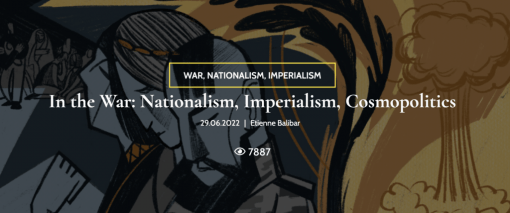It’s rare for a western European left-wing philosopher to be so well informed about Ukraine, and for that alone Etienne Balibar’s article “In the War: Nationalism, Imperialism, Cosmopolitics,” published back in June and translated here on the Spil’ne/Commons web site, deserves reading and sharing.
On the whole I think it is an excellent piece, which analyzes the Russo-Ukrainian war in all its multidimensionality — as a war of independence (for Ukrainians), a continuation of a “long European civil war,” a war that raises important questions about nationalism and neo-imperialism, a globalized and hybrid war involving rival military and economic alliances, and a war that is further “hybridized” by the “environmental catastrophe” that “shifts and subverts all borders in the world, particularly the borders between the habitable and inhabitable regions, and the ‘frontiers’ of exploitable regions at the cost of immense destructions of natural landscapes.”
I have a few minor qualms with the piece. One is that by referring first to the war’s being a “war of independence,” Balibar risks overemphasizing Ukrainians’ agency in causing it. The war is first and foremost a war of attempted colonial (imperial) conquest. That Russian hostility was triggered by the Maidan “revolution” of 2013-14 is not at issue. But that “revolution” did not challenge the boundaries of Ukraine or Russia; Russian incursions (in support of ostensible “separatists”) did. I take this as an oversight of emphasis, since Balibar is well aware that, as he puts it, “We can never forget which armies invaded Ukraine and currently destroy it.”
My second qualm concerns Balibar’s uncritical reference to Ukraine’s name meaning “borderland.” He writes:
As its very name indicates, Ukraine (within floating borders over the centuries) is a borderland, where culture and collective “belonging” are marked by multiplicity and hybridity, not lacking violence and social conflicts of course, since it was always torn between rival empires (or kingdoms), subjected to partitions and incorporations into hegemonic sovereignties, demographic revolutions by means of deportations and the introduction of foreign peoples, even genocides (of which there are two in the 20th century: the Bolshevik extermination of peasants through starvation, and the Nazi extermination of Jews through mass executions and the death camps)… The fundamental phenomenon, as I indicated a moment ago, is the bilingualism of the majority of the population, which owes a great deal to the Soviet school-system through which the current educated middle class was created.
The historical gloss here is quite appropriate, and the references to imperial rivalries, partitions and incorporations, demographic revolutions and genocides, are all accurate. But the correlation with “the bilingualism of the majority of the population” is not at all clear to me. (If history shapes current linguistic practice, one might expect Ukraine’s multiple imperial histories — Polish-Lithuanian, Austro-Hungarian, et al. — to have resulted in tri- or quadri-lingualism, for instance.) Comparing Ukraine to Belgium or Canada, both formally bilingual, to Switzerland with its four national languages, or to Ireland with its nominal bilingualism where Gaelic functions as a state language spoken only by a minority of the population and English is spoken or understood by all, show how little correlation there is between language use and a country’s status as “borderland,” “heartland,” or whatever else. (And that’s only looking at European examples.)
Underlying this issue is the fact that linguists are not entirely united around the etymology of “Ukraine” as meaning “borderland”: the word “okrayina” may refer to “border countries” or “provinces,” but the Ukrainian “u-krayina” or “u-krayini” can also mean “in the country” or “in-country.” In any case, it’s worth pointing out that a country’s name is hardly a determining factor in its development.
But these are very minor points compared to what Balibar gets right, which is mostly everything. The entire argument deserves to be read, as it builds its way carefully to some important conclusions, of which I’ll cite only one, as it covers so much ground:
there is a complete dissymmetry for a democratic country between the perspectives of being taken and swallowed again by a backward-looking autocratic empire, and the perspective of being incorporated into a federation which creates or perpetuates inequalities, but has set up rules for negotiating participation
The choice between a Russian Ukrainian future and a European Ukrainian future is, for this reason — for most Ukrainians — not much of a choice at all, especially now that the former has made visible what it means for it.

Thanks for mentioning this, and it’s important. But, Jesus, Balibar is an atrocious writer.
It’s translated from French, and a very scholarly, plodding kind of French. Not as bad as some French philosophers I’ve read. But I get your point.